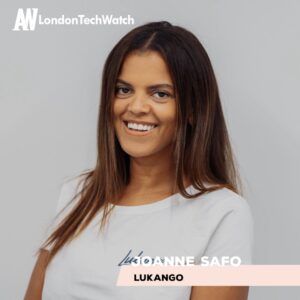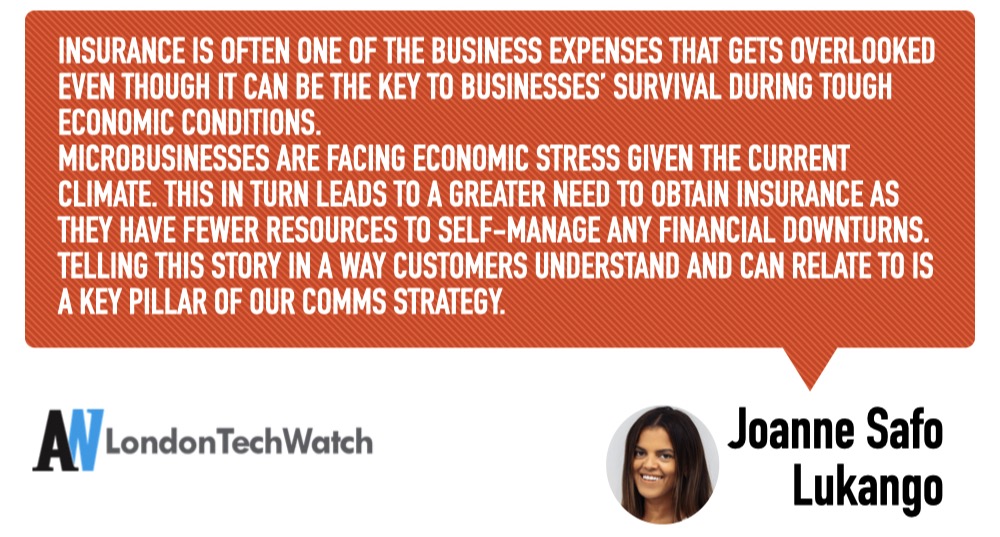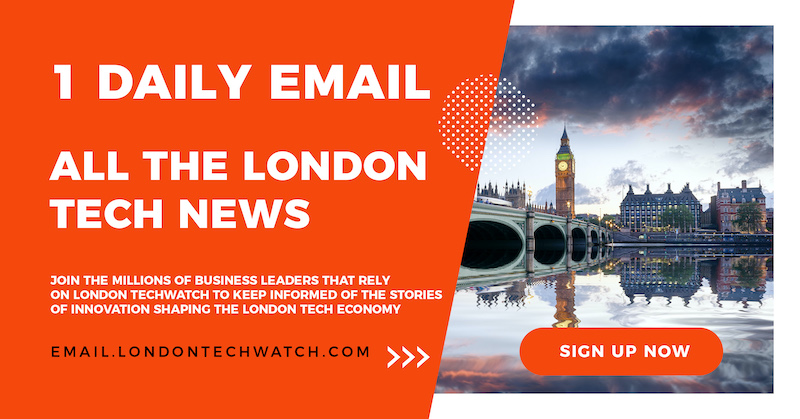It’s seemingly easy to be underinsured or overinsured when it comes to all forms of insurance, especially when it comes to business insurance. The thought of being overinsured and paying more leads to many companies unknowingly opting for the alternative where they are inadequately covered, which can be more expensive in the long run. Compounding the issue, the insurance industry has relied on a model that offers coverage with a very limited understanding of a business’s needs and operations. Lukango is an insurance platform that seeks to solve this dilemma by providing a data-centric approach to securing insurance. The platform uses algorithms to take actual data from a business to provide the correct coverage at a price that’s optimized. Lukango offers both a fixed price model as well as a variable model that’s adapted to a business’s growth. This makes insurance accessible for micro businesses, the segment that the company intends to focus on initially.
London TechWatch caught up with Lukango CEO and Cofounder Joanne Safo to learn more about the business, the company’s strategic plans, recent round of funding, and much, much more…
Who were your investors and how much did you raise?
We just closed a £275K pre-seed round. We are fortunate to have a number of highly experienced angel investors, including the former CEO of Bupa and board member of Admiral Group Evelyn Bourke, former Founder & CEO of Munich Re’s Digital Partners Andrew Rear, and former Senior Advisor to Nasdaq and CEO of Inbotiqa Mark Hunt.
Tell us about your product or service.
Each small business is unique so our proprietary intelligent algorithm uses data gathered from customers to provide them with the right product for them at a fair price. Applying data and smart algorithms allows our customers to flex and change the amount of protection needed as their businesses grow, with two products, Fix and Flex, offering comprehensive cover and straightforward choice. A fixed price for customers who want to know what they are going to pay upfront so they can plan their business finances, or a flexible price option designed to adapt to the growth of each business so they pay only what they need to.
On top of that, throughout our CX, we aim to eliminate the confusing insurance lingo traditionally associated with small business insurance – we are anti-jargon.
 What inspired the start of Lukango?
What inspired the start of Lukango?
I’ve always been fascinated by the science of insurance and its value, providing protection for the things we care about in life. Having spent years working on the build and launch of insurtechs, I saw a need in the market for a purpose-built micro solution and was driven to build it myself to address that gap. We also set out to change the face of the insurance industry – hopefully, we do that being a female-founded insurtech with a diverse executive team.
How is it different?
Our micro-segmentation is a key differentiator, we are not building products for everyone. Short-term we have a very narrow focus on microbusinesses and underserved business segments. By going deep rather than wide, we can truly understand the needs of our customers and design products and experiences that are uniquely positioned to work for them.
Everything we do is centered around a customer obsession. This translates into a hyper-focus on the customer – from the language we use to demystify insurance to our product design and our CX.
Finally, our “Flex” product utilises data to price our products more accurately, putting business owners in control of how little or how much protection they have and when that protection needs to be in place.
What market you are targeting and how big is it?
We are targeting the micro end of SMEs which is a huge market. There are about 5.3 million microbusinesses in the UK – approx 95% of all businesses. This small army is powering the UK’s economy. We estimate it to be worth c. £2BN+ and we have seen a steady trend in the growth of this market over the last 10 years.
Whilst we have an initial narrow focus on underserved business segments – like e-commerce businesses – our long-term goal is to be segment-agnostic. Once we have real-life customer validation and have honed our product-market fit, we will expand to the more competitive segments with bigger volumes but still apply our same micro-segmentation approach.
What’s your business model?
We make money through a commission from our insurance partners for each policy we sell. While we are of course focused on growth, we are equally focused on building profitable products – this will enable us to achieve an additional revenue stream through profit sharing.
How are you preparing for a potential economic slowdown?
Insurance is often one of the business expenses that gets overlooked even though it can be the key to businesses’ survival during tough economic conditions.
Microbusinesses are facing economic stress given the current climate. This in turn leads to a greater need to obtain insurance as they have fewer resources to self-manage any financial downturns. Telling this story in a way customers understand and can relate to is a key pillar of our comms strategy.

What was the funding process like?
Considering the current climate, the funding process was tough as you might expect.
We were initially focused on VCs but given we are pre-product, pre-revenue, we eventually agreed angel investors was the way to go. Once we made that switch, we found the funding process relatively smooth and fast. We were fortunate that our angel investors immediately recognised the opportunity we presented and the whole process only took a few months.
What are the biggest challenges that you faced while raising capital?
As a first-time founder, the biggest challenge I faced when raising capital was having no real idea what investors were looking for and focusing our pitch on what we thought was important. It wasn’t until we started pitching that we saw a trend in the things investors care about and identified gaps in our proposition.
I found the “bad” pitches the most helpful in refining our solution. My advice to any other first-time founders would be don’t spend forever trying to build the perfect pitch – try it out on some friendly investors and use the feedback to tighten up.
What factors about your business led your investors to write the check?
As we are at pre-seed, founder/market fit was really important. At this stage, investors are backing people and an idea – they need to believe you are the best team in the world to solve this problem. We are an experienced team with the right blend of insurance, technology, customer acquisition, and execution experience and we made sure to highlight this and our track record in our pitch.
We also made sure we knew our market and the opportunity – the problem you are trying to solve needs to be big enough to attract investment. Not all businesses are VC-backable – the market opportunity needs to be £100Ms or £BN’s for angels or institutional VCs to invest. They need to be able to see the long-term return. Getting this across in our pitch was key.
We also made sure we knew our market and the opportunity – the problem you are trying to solve needs to be big enough to attract investment. Not all businesses are VC-backable – the market opportunity needs to be £100Ms or £BN’s for angels or institutional VCs to invest. They need to be able to see the long-term return. Getting this across in our pitch was key.
We also worked hard on our product – making sure it was differentiated enough from our competitors and solving a real problem. Ultimately, we believe we offer a fresh approach that addresses a sizable underserved market.
What are the milestones you plan to achieve in the next six months?
Over the next six months, we aim to finish building and launching our products and platform in the market. We are also working towards proving our direct distribution within this timeframe. The number-one goal of our pre-seed round is to have live customers at the end of it.
What advice can you offer companies in London that do not have a fresh injection of capital in the bank?
Keep expanding your network and meeting new potential investors and partners. I set myself a goal of speaking to at least one founder, investor, or potential partner a week, just to catch up and share ideas. I find the best advice and support come from other founders. They are usually the most willing to share information and connections as they have been there and understand the struggle. I heard a piece of advice this week that stuck with me – always ask at the end of every meeting if is there someone you can connect me with to help – something I will be doing going forward.
Keep expanding your network and meeting new potential investors and partners. I set myself a goal of speaking to at least one founder, investor, or potential partner a week, just to catch up and share ideas. I find the best advice and support come from other founders. They are usually the most willing to share information and connections as they have been there and understand the struggle. I heard a piece of advice this week that stuck with me – always ask at the end of every meeting if is there someone you can connect me with to help – something I will be doing going forward.
Also, as a founder, I believe one of the most important traits you need is optimism. You lead and drive the business in good times but it is how you persevere in the tough times that will make you successful or not. All investors want something different so don’t give up just because you have done 20 unsuccessful pitches – someone told me it can take up to 60 pitches before you convert so I always kept that at the back of my mind. No matter how tough it gets, whether that’s because of lack of money, or partners or customers, the moment you no longer believe then your team and no one else will. We often say to each other at Lukango – Keep the faith!
Finally, I would say for the big tasks have a plan B and C. As a startup, things will always go wrong so having alternative plans in place to fall back on is essential.
Where do you see the company going now over the near term?
We will be deploying the funding to accelerate the launch of our products and platform and ramp up our customer acquisition strategy. We will also be looking at making some further key hires to expand the team.
What’s your favourite outdoor activity in London?
I’m not an outdoorsy person but my favourite thing to do in London is watching live music and going to concerts – I love 90s RnB and garage music! The last person I saw live was Snoh Aalegra, who was amazing.




